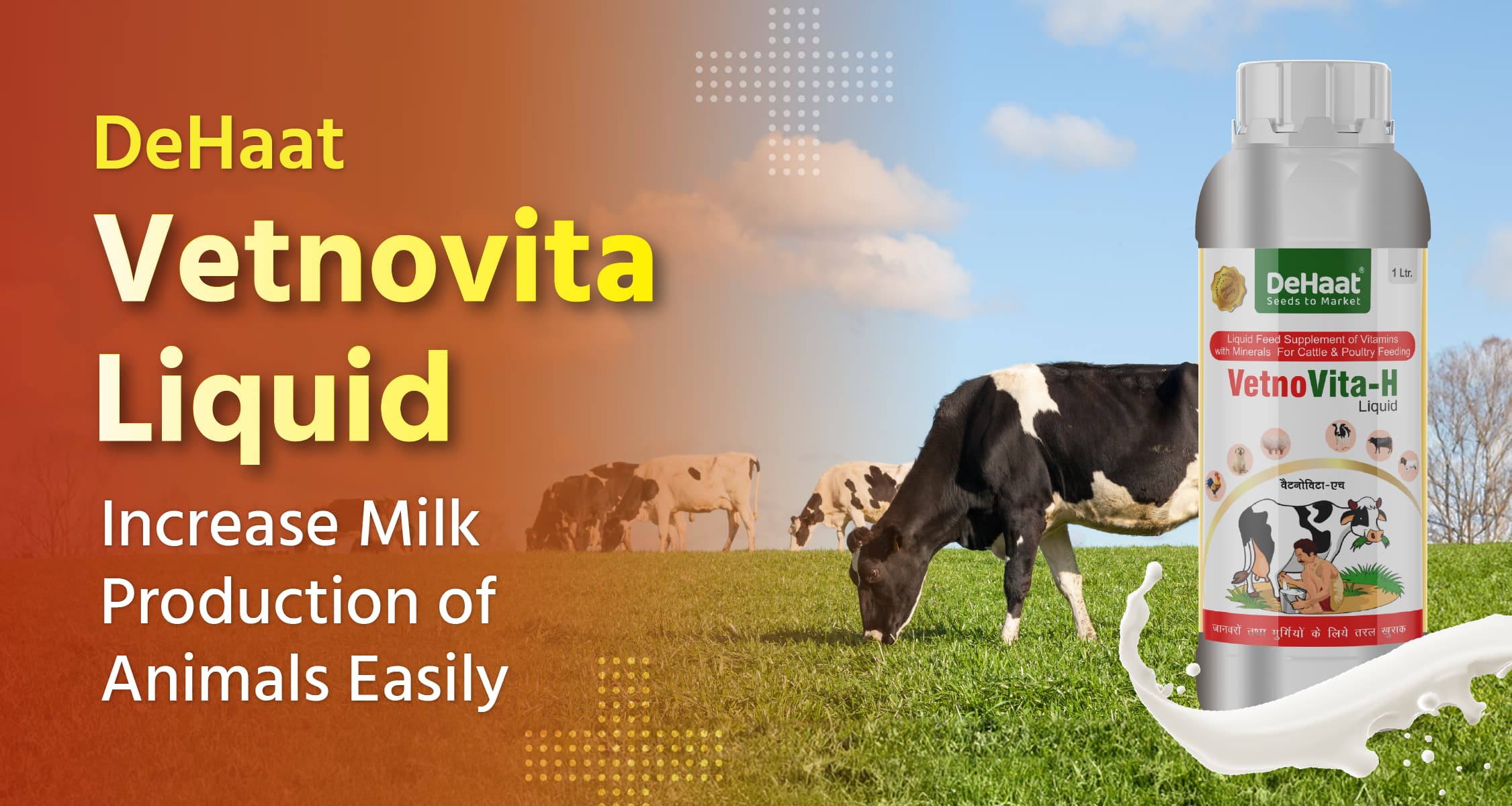Increase the milk production of animals with DeHaat Vetnovita Liquid

In the dairy industry, there is a strong connection between milk production capacity and animal health. In India, where dairy farming is a major source of livelihood for millions, it is crucial to ensure that animals are healthy and their production capacity is enhanced. To provide greater benefits to livestock owners and maintain better health for their animals, DeHaat has introduced an excellent product called DeHaat Vetnovita-H Liquid. To improve the health of animals and increase their milk production, include DeHaat Vetnovita-H Liquid in their diet. Here in this post, we will go through detailed information on the causes of reduced milk production in animals, the features of DeHaat Vetnovita-H Liquid, and the measures to enhance milk production capacity in animals.
Some major reasons for the decrease in milk production capacity in animals
- Nutritional Deficiency: Inadequate or unbalanced diets can lead to nutritional deficiencies in animals. A lack of essential nutrients such as protein, energy, vitamins, and minerals in their bodies can significantly affect milk production.
- Health Issues: Animals suffering from diseases like mastitis, foot and mouth disease, and other infections may experience a reduction in milk production.
- Parasite Problems: Parasites like ticks and lice can cause stress in animals, impacting their milk production capacity.
- Stress: Extreme temperatures, overcrowding, or lack of proper care can cause stress in animals, which is a major factor in reduced milk production.
- Age: As animals age, their milk production often decreases. This issue is particularly common in cows, where older animals produce less milk.
- Breeds: The breed of the animal also plays a role in milk production. Dairy breeds are known for their high milk yield, while some breeds genetically have lower milk production capacity.
Benefits of DeHaat Vetnovita-H Liquid
- Increases Milk Production: Enhances milk yield in animals.
- Promotes Udder Health: Aids in keeping the udders healthy and strong.
- Improves Milk Retention Capacity: Boosts the capacity of the udders to retain milk.
- Reduces Risk of Mastitis: Lowers the likelihood of mastitis (udder inflammation) in animals.
- Prevents Alopecia: Protects against alopecia (hair loss), preventing issues related to hair fall in animals.
- Maintains Skin Health: Helps in keeping the animal's skin healthy.
- Improves Hatchability and Reduces Mortality: Enhances hatchability and helps decrease the mortality rate of newborn animals.
- Provides Balanced Energy: Supplies balanced energy to the animals.
Doses of DeHaat Vetnovita-H Liquid
- Include 10-15 ml of DeHaat Vetnovita-H Liquid into the diet of lactating female animals.
Some Other Ways to Increase Milk Production in Animals
- Proper Nutrition: Providing a balanced diet that meets the nutritional requirements of the animals can help increase milk production. This includes supplying adequate amounts of protein, energy, vitamins, and minerals.
- Adequate Water Supply: Ensuring that animals have access to clean and sufficient water is essential for milk production.
- High-Quality Feed: Offering animals high-quality supplementary feed, fresh green fodder, silage, and grass can help boost milk production.
- Regular Health Checks: Conducting regular health checks and timely treatment of any diseases or infections can prevent a decline in milk production.
- Proper Milking Techniques: Using appropriate milking techniques, such as cleaning the udder before milking, utilizing clean milking machines, and milking at regular intervals, can be beneficial in increasing milk production.
- Comfortable Housing: Providing comfortable housing that is well-ventilated, clean, and spacious can reduce stress in animals and help enhance milk production.
Have you ever included DeHaat Vetnovita-H Liquid in your animals' diet? Share your response and experiences in the comments below. For more information on improving animal health, follow the 'Pashu Gyan' channel now. Don't forget to like and share this post to help reach more farmers.
Frequently Asked Questions (FAQs)
Q: What is the best fodder for dairy animals?
A: Cowpea, maize, Napier grass, alfalfa, and berseem are excellent fodders for dairy animals. These are not only tasty for the animals but also help increase their milk production. Additionally, green fodders such as sorghum, guar, millet, and barley can also be included in their diet.
Q: What should be given to increase the milk production of animals?
A: To enhance the milk production capacity of animals, provide them with a balanced diet rich in protein, energy, vitamins, and minerals. Include high-quality animal supplement fodder, green fodder, and dry fodder in their diet. Avoid feeding them leftover food from the previous night or stale fodder. Ensure they have access to clean water.
Q: Why are minerals necessary for animals?
A: Minerals are essential for the physical development of animals, the structure and strength of teeth and bones, improving reproductive capabilities, increasing milk production, and maintaining disease resistance.
जारी रखने के लिए कृपया लॉगिन करें

फसल चिकित्सक से मुफ़्त सलाह पाएँ
